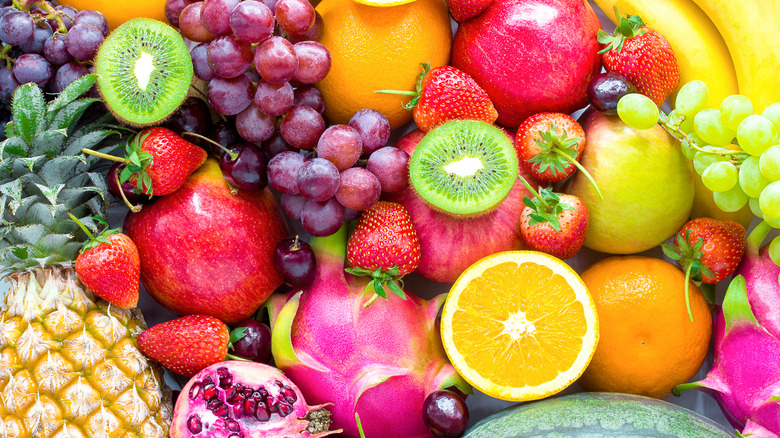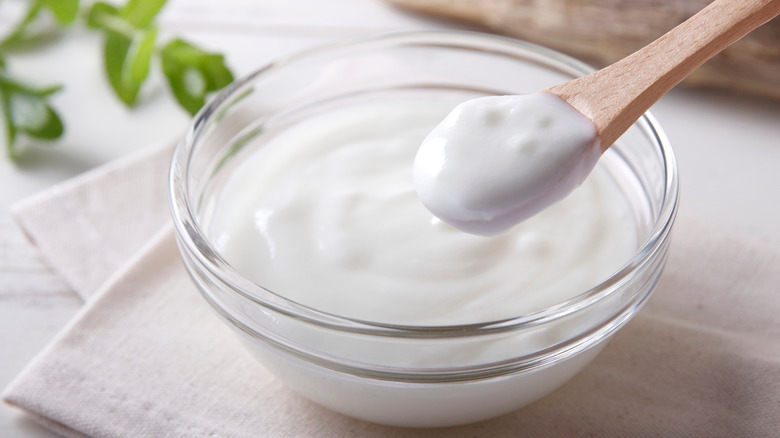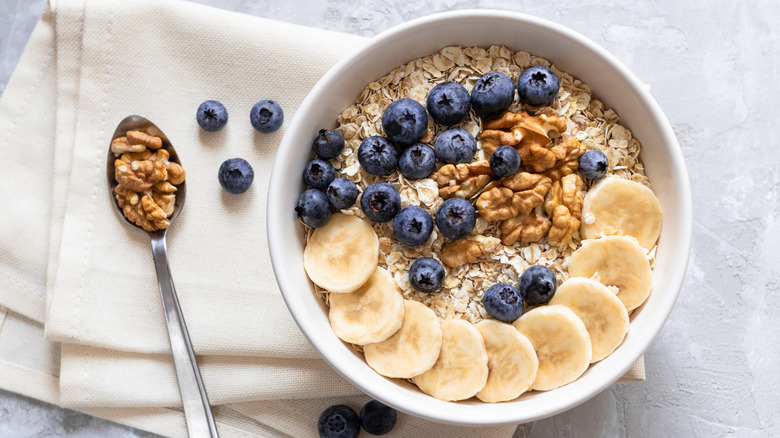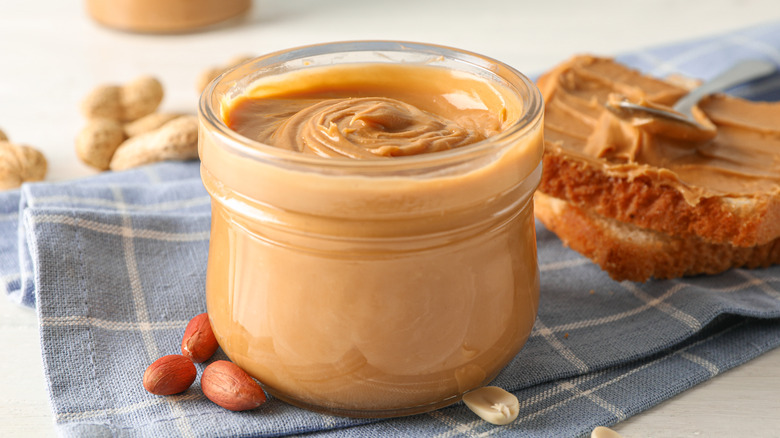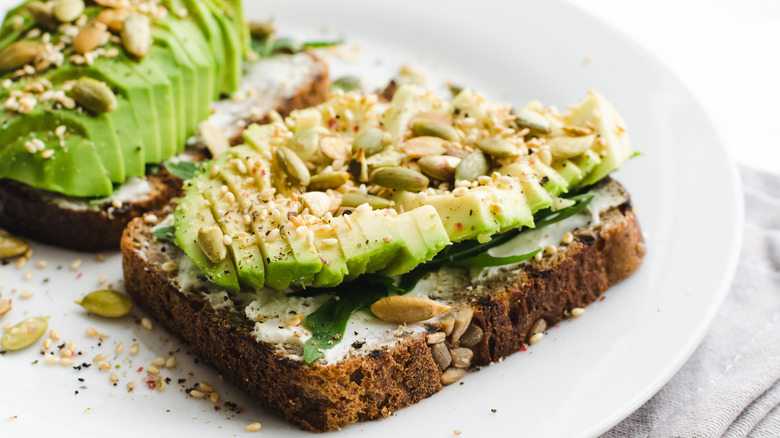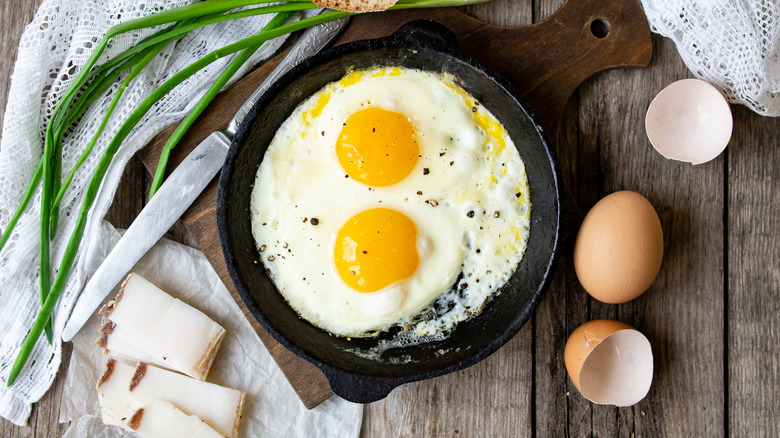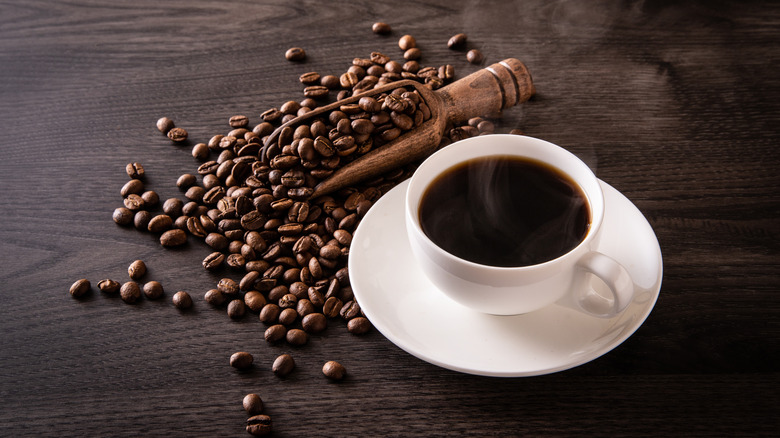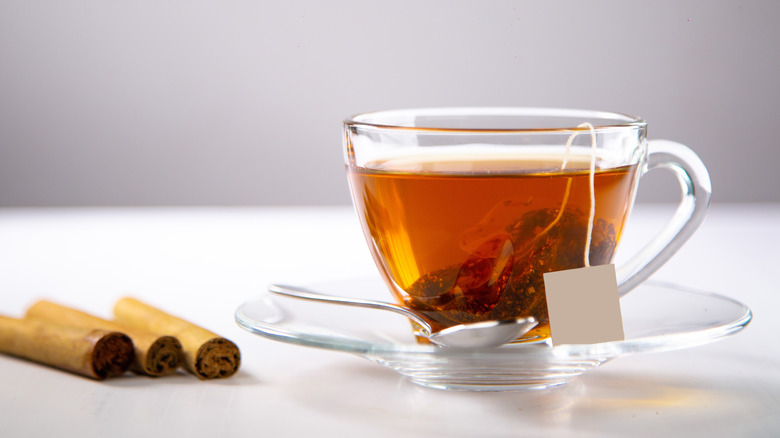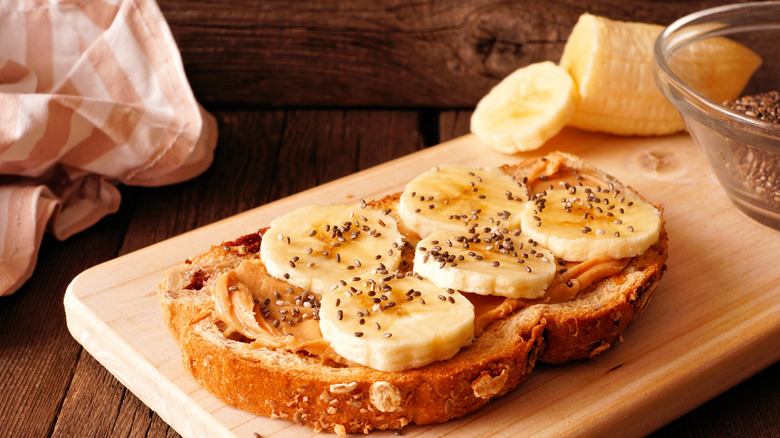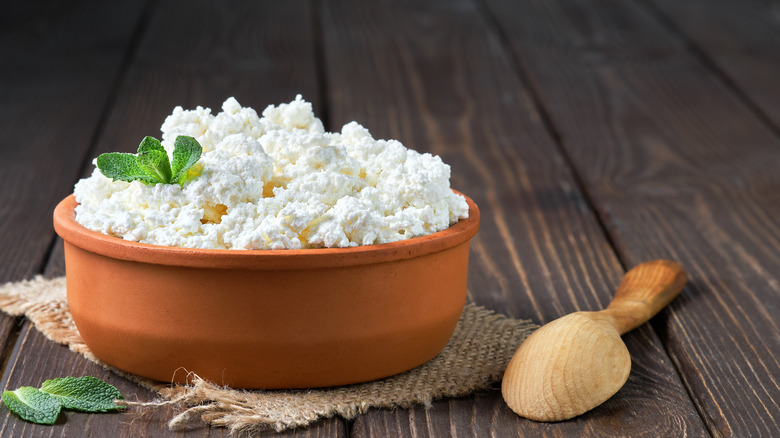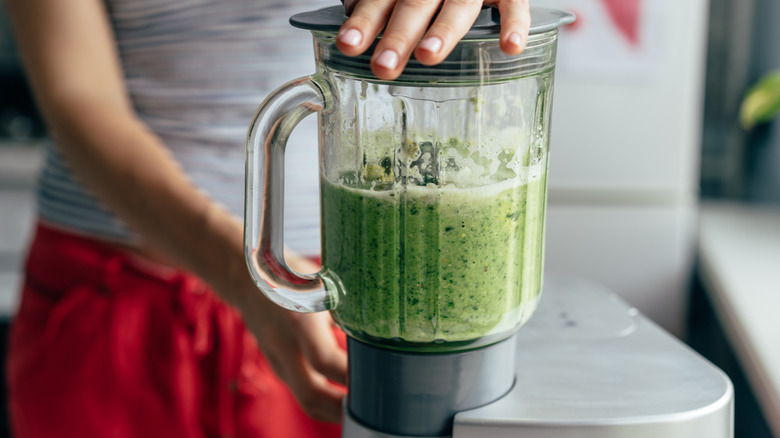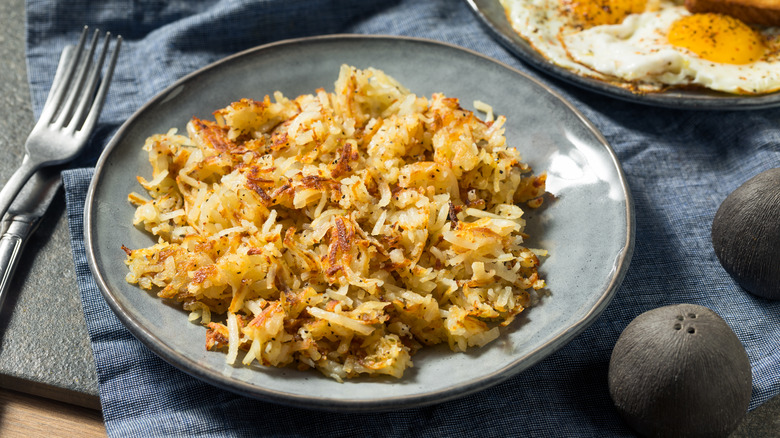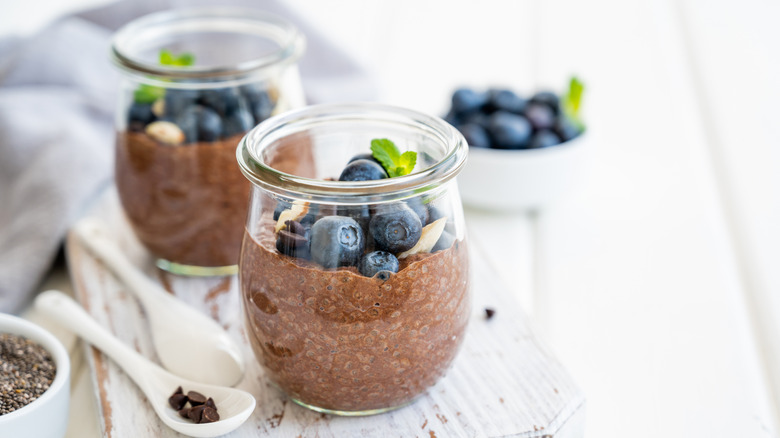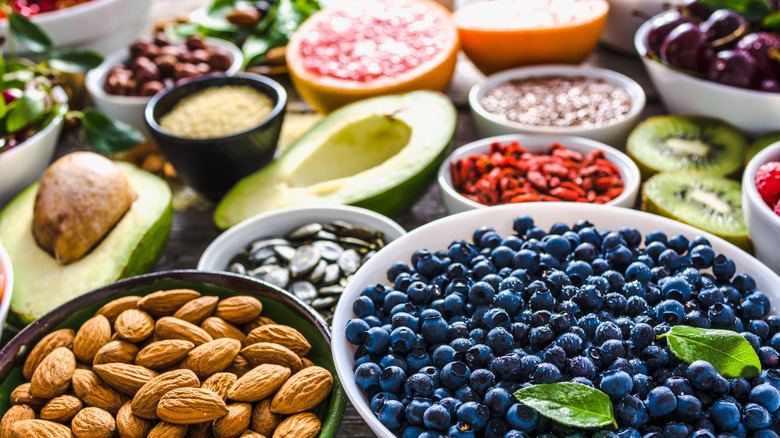Breakfast Foods That Healthy People Actually Eat
No two people have the exact same appetite. Some people wake up feeling ravenous whereas others wake up and aren't much in the mood for food until a few hours have passed (via Medical News Today). Regardless of which broad category you fit into, it's important to keep in mind that your first meal of the day is your chance to give your body the nutrition it needs to power you through the hours that follow (via WebMD). Starting your morning with junk food means you're likely going to crash and burn before you've even made it to lunch.
So what does a healthy breakfast actually look like? Good question! While the makings of a healthy morning meal can vary depending on your goals (such as losing weight or fueling an athletic training session), it's easy to find an option that's right for you based on what others with similar goals are doing. Here are what several dietitians, athletes, doctors, and all-around healthy people count on to fuel themselves at the start of their day.
All kinds of fruit
When you don't have much of an appetite in the morning (even if you have a hearty appetite throughout the rest of the day), having breakfast might be the last thing you want to do. But that's why fruit is always a great starting point — it's light and sweet.
Several nutritionists who shared their go-to breakfasts with HuffPost included fruit on their breakfast menu. Registered dietitian Alissa Rumsey says she puts fresh strawberries and apples on her oatmeal to give it a little bit of sweetness, and registered dietitian Christa Mantey uses fresh fruit in her smoothies. These experts often combine fruit with a source of protein (think: eggs) and fat (think: chia seeds), which increases satiety.
Fruit is a broad food group, encompassing many colors, textures, and tastes so you can always count on variety without getting bored. This also means you'll get plenty of vitamins, minerals, and antioxidants that will help your body perform at its peak and ward off sickness, according to Medical News Today. Fruit also tends to be low in calories so they're a good option for people who are trying to control their weight.
Yogurt is a breakfast staple
Yogurt contains vital nutrients like calcium, which helps you build strong bones. But maybe the standout nutritional factor of yogurt is that it's a source of live active cultures, also known as probiotics. It's because of those probiotics that registered dietitian nutritionist Lauren Harris-Pincus told Prevention that yogurt holds a distinction as a great breakfast.
Yogurt is a fermented food, and the process to make it results in the production of bacteria. Before you let that idea make you squirm, remember that not all bacteria are bad. Your body is full of live microorganisms that serve an important purpose in your internal processes. The bacteria in yogurt are the gut-friendly, good-for-you kind and they help replenish your digestive tract so you can properly break down food, absorb nutrients, and fend off diseases, according to Harvard Health Publishing. Note that some of the health benefits of probiotics are either exaggerated or not supported by conclusive research, so be realistic in your expectations when you add yogurt to your breakfast menu.
Healthy people love oatmeal
We may live in an era when ultra-sugary bowls of refined carbohydrates (aka cereal) reign supreme, but a simple bowl of hot whole grains is still a popular — and healthy — choice for breakfast (via Statista). Oatmeal is a classic breakfast choice, and for good reason. Cardiologist Ashok Mittal told Well+Good that oatmeal is his go-to recommendation because it's so good for your heart. Oats have a type of fiber called beta-glucan, which works to lower your cholesterol and improve your blood pressure.
While fiber is usually associated with healthy digestion, it's also good for heart health because, as The Nutrition Source explained, the beta-glucan binds with cholesterol and carries it out of the body as it makes its way through your intestines. This explains why whole grains like oats are highly regarded for reducing your risk of cardiovascular disease. The fiber in oatmeal will also help improve your feelings of satiety, which can help with weight control.
For maximum benefit, avoid flavored oatmeal, which is usually full of added sugars, and opt instead to top your bowl with healthy mix-ins like fruit, nuts, seeds, or yogurt.
Nut butter is a must
If you think peanut butter is only for sandwiches at lunchtime, think again. Plenty of healthy people love including nut-based spreads like peanut butter in their breakfasts. NBC News reported that Olympians Brittany Bowe, Sadie Bjornsen, and Erin Hamlin are all big fans. Peanut butter is calorically dense (that is, it has a lot of calories per volume) so it's great for fueling intense workouts. The heart-healthy fats will keep you feeling full until your next meal, and the 8 grams of protein per serving are good for rebuilding muscle after your training session. Peanut butter also tastes great with other breakfast foods like fruit, oatmeal, and yogurt.
If you're not a fan of peanut butter, or if you have a peanut allergy, don't despair — there are plenty of other nut butters to choose from, and they're all great for you. Nutritionists told Women's Health that almond butter, cashew butter, walnut butter, and pistachio butter for their nutritional profiles. You can also go with a seed-based spread like sunflower seed butter or even tahini, which is made from roasted sesame seeds. Count on nut butters for nutrients like vitamin E, which is good for your skin, and magnesium, which fights inflammation.
Avocado for breakfast? Yes!
With the popularity of avocado toast, it's safe to say avocado is an acceptable breakfast food. And that's great because this fruit is a nutritional powerhouse! (Yes, even though you might think of avocados as a type of vegetable, these green beauties are botanically classified as a type of berry.)
Avocados are usually regarded as healthy because of their good-for-your-heart monounsaturated fat content, but there's another reason you might want to start your day by slathering avocado on your toast. Dermatologist Elizabeth Geddes-Bruce recommends avocado toast because this type of fat is good for your skin — it will give it a luminous glow that radiates good health (via Livestrong). Other dermatologists interviewed by the publication also recommend avocado because it can increase collagen production, which makes your skin firmer and more elastic. Avocados even keep your blood sugar in check and may even prevent acne breakouts.
Additionally, Taste pointed out that avocados provide potassium, which is great for improving your muscle strength, and their natural sweetness means you can satisfy your craving for something sugary.
Despite what you may have heard, healthy people do eat eggs
For many years, eggs got a bad reputation among health enthusiasts who were hesitant about the high levels of dietary cholesterol. Eating eggs wasn't good for your heart, or so the thinking went (via BBC). But with our contemporary understanding of nutrition, many health experts encourage eggs as a great breakfast option because of their high protein content. Plus, when eaten in moderation, their cholesterol isn't as harmful as once believed.
Cardiologist Tiffany Sizemore-Ruiz told The Healthy that she opts for eggs at breakfast because the protein content is good for satiety. She doesn't find herself feeling hungry shortly after her morning meal — something that can happen when you have a low-protein meal that leaves you craving something long before lunchtime.
This is especially great news for people who are trying to watch what they eat. According to a study published in the International Journal of Obesity, eating eggs for breakfast as opposed to a calorically equivalent bagel led to lost weight and reduced body fat.
Coffee is acceptable
If you're somebody who feels not quite yourself until you've had a cup of coffee in the morning, you're not alone — and you're not necessarily unhealthy. Plenty of fitness enthusiasts depend on coffee to help them get revved in the morning before they hit a training session. Fitness coaches told Men's Health that having a morning cup of coffee along with some food will boost your athletic performance. The caffeine buzz will peak about 45 minutes right after you first sip your coffee, so be sure to time it accordingly — and, of course, have something nutritious to eat with your coffee instead of simply relying on coffee alone.
But it's not just your workout that could improve when you start your day with coffee. Johns Hopkins Medicine points to a breadth of benefits related to drinking coffee, including an improved ability to process glucose, thus staving off type 2 diabetes, and reduced risk of heart failure. You also lower your risk of developing serious diseases like Parkinson's disease, Alzheimer's disease, and colon cancer.
Tea works too
Maybe coffee isn't exactly your speed but you'd still like something caffeinated to start your day. Tea is a great beverage that will give you a milder boost and may offer other benefits as well. Registered dietitian nutritionist Toby Smithson explained to HuffPost that drinking copious amounts of tea helps her manage her diabetes, which she was diagnosed with when she was eight years old. She attributes this to the tea's polyphenols, which can help your body better handle insulin. It doesn't matter whether the tea is hot or cold — tea seems equally beneficial at any temperature.
Drinking tea may offer such health perks as weight loss, stronger bones, a more powerful immune system, and a reduced risk of chronic conditions like heart disease or cancer (via Today). Green tea has the highest level of flavonoids — the compounds in tea that promote good health — but black and oolong teas are good for you too.
Whole-wheat toast has a good reputation for a reason
Toast makes a simple and versatile start to the day. You can enjoy it plain if you don't have much of an appetite or, if you're feeling hungrier, you can top it with something delicious and nutritious. But the first choice you have to make is what kind of bread you're going to use. And unless you're working out first thing in the morning, dietitian Allen Tran told Outside that whole-grain or nutty bread is preferable. On the other hand, a piece of plain toast made from refined white bread could be a source of quick energy for athletes who are starting their day with a training session.
This is because refined carbohydrates are broken down very quickly, providing you with glucose your body can use right away. Complex carbohydrates, such as those found in whole-wheat toast, are broken down much more slowly, providing you with a steady stream of energy throughout the day, as Verywell Fit explained. You can also count on the fiber and protein found in whole wheat to keep you full. Don't hesitate to top your whole-wheat toast with other healthy foods like nut butters, eggs, or avocado for extra nutrition.
Healthy people know the power of cottage cheese
Trying to get more protein in your diet? That's a healthy goal to have considering protein helps you build muscle, stave off hunger, and burn fat. And when it comes to breakfast options, registered dietitian nutritionist Charlotte Martin told Eat This, Not That that cottage cheese is an underrated source of protein. Martin said this because of cottage cheese's versatility — whether your breakfast preference is for a smoothie, pancakes, or toast, you can make use of cottage cheese and up the protein factor of your morning meal.
As Healthline detailed, a cup of low-fat cottage cheese has 28 grams of protein for only 163 calories. That's a lot of protein for a relatively low number of calories! This makes cottage cheese great for weight loss and muscle building. It also has calcium for building strong bones, plus B vitamins for energy metabolism. Consider making cottage cheese part of your breakfast by stirring it into your pancake batter, topping it with fresh fruit, adding it to a smoothie, or spreading it on your toast.
Healthy people include spinach in their breakfasts
You might be thinking, "But spinach isn't a breakfast food!" Or is it? While spinach might not be a traditional breakfast staple like oatmeal or fruit, there are plenty of ways to use this leafy green in your morning meal. For example, registered dietitian Anna Taylor told Cleveland Clinic that spinach or other greens can be added to smoothies. The flavor is so mild that you can easily mask spinach with some fresh fruit, and it's an easy way to ensure you're getting vegetables at breakfast.
Spinach is a smart addition to your diet because it's rich in iron, a mineral that your body uses to make hemoglobin and carry oxygen through your bloodstream to every cell in your body (via Medline Plus). Spinach is also a source of fiber for good digestive health and antioxidants for fending off chronic diseases.
If you like the idea of getting some spinach at breakfast, don't be afraid to be creative in your use of it. Good Housekeeping suggests frittata muffins made with spinach and prosciutto or a breakfast salad made with bacon and eggs. These recipes have plenty of protein to keep you feeling satisfied all the way until lunch.
Potatoes can be healthy
Like spinach, potatoes aren't your traditional breakfast food, but that doesn't mean they aren't a welcome part of the morning menu, particularly for healthy people. In an article for Health, registered dietitian Cynthia Sass recommended people use potatoes as the base of a veggie scramble or baked frittata, while nutritionist Jerlyn Jones told Prevention that halved sweet potatoes can serve as an alternative to toast when topped with healthy foods like nut butter or cheese.
Even a traditional breakfast side like hashbrowns or home fries can be healthy options as long as you prepare them with moderate amounts of oil. Indeed, it's usually the preparation method that makes potato dishes unhealthy, not the potato itself (via LiveScience). A plain medium-sized potato has only 110 calories and no fat, but they are good sources of potassium for managing your blood pressure, vitamin B6 for optimal neurological health, and fiber for proper digestion. They also have antioxidants to help you reduce your risk of disease.
Dietitians swear by chia seeds
There's nothing wrong with having a sweet tooth. And if you're looking for a healthy way to satisfy your sugar craving, chia pudding is a great option. Not only is it nutritious, but it's also incredibly simple. As registered dietitian Gillian Culbertson told the Cleveland Clinic, chia pudding takes only two base ingredients: chia seeds and milk. Let them soak overnight and you can then start your day with a versatile treat you can flavor with ingredients like chocolate, fruit, or nut butter. You could have a new breakfast option for every day of the week and never get bored.
What's great about chia seeds is that they have a type of fat known as omega-3 fatty acids, which are important for a healthy heart, healthy joints, and a healthy mind. Chia seeds also have fiber, iron, potassium, and calcium. The Nutrition Source notes that they are helpful for folks looking to maintain their weight, as well as beneficial for lowering cholesterol and keeping type 2 diabetes in check.
Any breakfast as opposed to no breakfast at all
Maybe you're not a breakfast person. Even hearing about all sorts of morning foods is not enough to get you excited about what's often described as "the most important meal of the day" (via WebMD). You find yourself wondering whether you can just skip breakfast and wait until lunchtime to work up an appetite.
Although breakfast isn't necessarily as mandatory as older nutrition advice might have you believe, you're still better off starting the day with a little bit of nutrition rather than having nothing at all. Registered dietitian Nancy Clark, writing for Active, deemed breakfast "the meal that makes champions" because it gives you lots of energy from the very start of your day, which is especially healthy for athletes.
It's better to get a good nutritious breakfast than try to push your way through a workout without anything inside your belly. Skipping breakfast can leave you underperforming, something that's ultimately detrimental to your fitness efforts. The Cleveland Clinic concurs with this wisdom. Although you shouldn't worry that you will necessarily ruin your health by skipping breakfast, it's still true that nutrition first thing in the morning can set you up for more alertness and help you maintain a good appetite for proper weight management.


